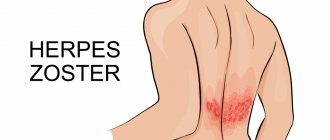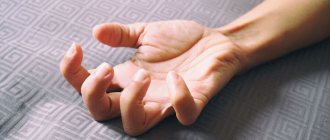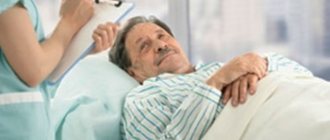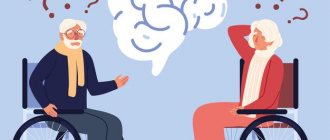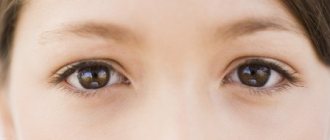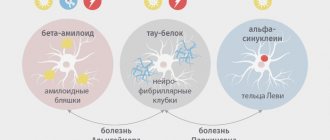Disease Information
Alzheimer's disease gets its name from the German psychiatrist who first described its symptoms in 1901. Moreover, the first mentions of the loss of reason were found in ancient treatises. Currently, there are three theories of the development of the disease:
- cholinergic: degeneration is associated with a decrease in the synthesis of acetylcholine, which is responsible for the transmission of nerve impulses;
- amyloid: disruption of the nervous system occurs against the background of deposition of pathological amyloid protein;
- tau hypothesis: the development of the disease is provoked by a change in the structure of the tau protein, which is responsible for the proper functioning of neurons.
To date, the most likely theory for the development of Alzheimer's disease is amyloid, but research is ongoing.
Make an appointment
Causes of Alzheimer's disease
To date, the exact causes of Alzheimer's disease have not been established. There are three main hypotheses with which scientists try to explain the occurrence of the disease:
- Cholinergic theory .
Its essence lies in the fact that with age, the content of acetylcholine in the human body, a substance that takes part in the transmission of nerve impulses between neurons, decreases. It is the lack of acetylcholine that leads to the development of irreversible changes in the brain and the development of Alzheimer's disease. To confirm this theory, patients were given drugs that corrected the lack of acetylcholine, but, unfortunately, this did not produce visible results, and the theory was not confirmed. - Amyloid theory . According to her, the development of Alzheimer's disease is caused by the accumulation of amyloid in brain tissue. When conducting an experiment on mice, they were injected with drugs that dissolve amyloid plaques. But the introduction of such drugs to people with Alzheimer's disease did not produce visible results.
- TAU hypothesis . According to her, the TAU protein, which is part of neurons, accumulates over time in nerve cells, preventing them from functioning normally, which ultimately leads to the death of neurons and the development of Alzheimer's disease.
Causes
The exact causes of Alzheimer's disease have not yet been clarified. It has been proven that the risk of disease increases significantly:
- with a hereditary predisposition (the disease has been proven to be associated with certain gene mutations);
- for acute and chronic disorders of the blood supply to the brain (stroke, transient ischemic attacks, atherosclerosis, arterial hypertension, etc.);
- against the background of concussions or brain contusions;
- for benign and malignant brain tumors;
- in people suffering from depression, as well as those who have suffered severe psychological trauma;
- against the background of bad habits (smoking, alcohol abuse), as well as acute or chronic intoxication;
- with low intellectual activity throughout life.
Age is one of the main predisposing factors: the older the person, the higher the risk of developing pathology. In addition, women get sick more often than men.
Stages and symptoms
Alzheimer's disease has a long course. It develops gradually and practically does not manifest itself for a long time. As pathological changes increase, symptoms become more noticeable. Doctors distinguish four stages of development of the disease, each of which has its own symptoms.
Predementia
This is the initial stage of Alzheimer's disease, characterized by mild symptoms. Most of them can only be identified through special testing. Over time, the patient and his relatives note:
- deterioration of short-term memory: a person poorly remembers events that happened the day before, while older facts are reproduced perfectly;
- problems with acquiring new knowledge and skills;
- decreased ability to concentrate work;
- difficulty remembering individual words, which does not cause significant discomfort during a conversation;
- general slowness of speech;
- slight deterioration in motor coordination.
Simultaneously with cognitive impairment, apathy begins to develop, which accompanies a person at all stages of Alzheimer's disease.
Since the symptoms are mild, most people are in no hurry to see a doctor, attributing problems to the natural aging process. The stage lasts 7-8 years.
Early dementia
At this stage, short-term memory disorders become clearly visible, and it becomes impossible to attribute them to normal aging. At the same time, the person perfectly remembers events from his youth, any learned facts, and applies old skills. Many patients also develop:
- apraxia: a disorder in performing sequential actions, for example, unbuttoning and fastening buttons, sewing, drawing, etc.;
- agnosia: impaired recognition of objects, can be visual, auditory, olfactory, gustatory or sensitive (tactile), as well as total;
- speech disorders: decreased tempo, poor vocabulary, problems expressing specific thoughts.
The patient can perform simple self-care actions, but complex tasks are no longer possible for him.
Moderate dementia
At this stage of Alzheimer's disease, the patient loses the ability to live independently. He has:
- pronounced agnosia and apraxia;
- paraphasia: speech becomes meaningless because the person chooses words incorrectly;
- dysgraphia and dyslexia: loss of writing and reading skills.
As a result, a person stops performing daily tasks: eating, hygiene procedures, changing clothes. Memory disorders continue to progress, the patient does not remember and does not even recognize close people. Psychiatric symptoms develop:
- emotional instability;
- aggressiveness or tearfulness;
- refusal to accept help;
- vagrancy;
- rave.
The patient at this stage requires constant supervision from relatives, since he may cause harm to himself or others.
Severe dementia
The last stage of Alzheimer's disease inevitably turns a person into a helpless disabled person:
- speech ceases to be coherent, the patient communicates in separate words or short phrases;
- severe apathy develops, at times turning into aggression;
- the ability to perform simple actions is lost;
- control over physiological functions disappears.
Ultimately, the person becomes bedridden, resulting in loss of muscle mass, pneumonia, and bedsores.
Symptoms of Alzheimer's disease
There are 3 stages of Alzheimer's disease, which successively replace each other:
- pre-dementia;
- early dementia;
- severe dementia.
The first sign of the disease is a slight memory disorder. It becomes difficult for a person to remember new information and recall previously received information. Abstract thinking is impaired, sometimes the patient has difficulty understanding the meaning of words and their connections. Apathy appears, the person becomes withdrawn and indifferent. This condition can last for 8-10 years, after which the second stage of the disease begins.
Memory lapses become more and more severe, the sequence of actions and clarity of speech are disrupted . It becomes difficult for a person to express his thoughts, his vocabulary is greatly reduced. Coordination is impaired - the patient cannot draw, write, it is difficult for him to fasten buttons and get dressed.
Long-term memory begins to deteriorate , the patient ceases to recognize relatives. His behavior changes - the person becomes irritable, cries a lot, unreasonable aggression appears, he may begin to periodically leave home in an unknown direction.
At the last stage, complete destruction of the personality occurs . The patient becomes apathetic, practically loses speech, and is completely dependent on outside care.
Diagnostics
Diagnosis of Alzheimer's disease and determination of its stage are carried out by doctors from the Neurology Department and psychiatrists. The set of examinations includes:
- survey and collection of complaints;
- studying the history of the disease (when the first problems appeared, how quickly they grew, etc.);
- assessment of life history: previous and existing diseases, injuries, hereditary factors;
- detailed neurological examination;
- laboratory diagnostics: general blood and urine analysis;
- biochemical blood test: glucose level, lipid spectrum, coagulation indicators, etc.;
- examination of cerebrospinal fluid to detect beta-amyloid (one of the specific signs of Alzheimer's disease);
- electroencephalography;
One of the main methods for diagnosing Alzheimer's disease is neuropsychological tests to assess cognitive impairment:
- name the objects shown in the picture;
- remember 5 unrelated words, repeat them immediately and after 3 minutes;
- distribute words into categories (food, animals, furniture, etc.);
- perform simple arithmetic operations;
- draw a clock showing a specific time;
- draw a picture or write a sentence from dictation.
If necessary, additional consultations and examinations are prescribed.
Diagnosis of Alzheimer's disease
The main methods for diagnosing the disease are:
- collecting anamnesis, interviewing the patient and his family members;
- neuropsychological tests - are carried out to check the patient’s memory and intellectual functions; based on the test results, the doctor can make a primary diagnosis;
- blood test (general, biochemical, hormones - detect metabolic disorders in the body, infectious inflammatory processes, anemia, hypovitaminosis and other pathological conditions of the body);
- chemical analysis of cerebrospinal fluid - detect the presence of specific proteins in the cerebrospinal fluid;
- PET scan – it can be used to detect Alzheimer’s disease in the early stages;
- MRI, CT - performed to exclude other brain diseases with similar symptoms.
Differential diagnosis is carried out to exclude thyroid diseases, atherosclerosis, brain tumors, Parkinson's disease, Pick's disease, stroke.
Treatment of Alzheimer's disease
Treatment is aimed at slowing the progression of the pathology. Doctors use drugs from various groups to improve the functioning of the central nervous system and relieve the main symptoms:
- anticholinesterase drugs aimed at improving memory (donepezil, reminil and others);
- memantine, which slows the progression of dystrophy and reduces the severity of symptoms (the only drug approved by WHO for the treatment of Alzheimer's disease);
- drugs to improve metabolism in brain cells (mexidol, vinpocetine, pentoxifylline);
- nootropics (Cerebrolysin, Actovegin) to stimulate the formation of additional connections between nerve cells;
- symptomatic drugs: antidepressants, antipsychotics, anxiolytics, etc.
The combination of drugs, their dosage, frequency and duration of administration is selected by the doctor on an individual basis. Often, the drug regimen is adjusted during treatment to achieve an optimal result with a minimum number of side effects.
Various psychotherapeutic techniques are used as a complement to drug treatment. They help reduce aggression and anxiety, improve the quality of thinking and stimulate memory. A good effect is provided by:
- art therapy: improves the emotional state of the patient, reduces the level of anxiety and depression, reduces aggression;
- sensory room activities and sensory integration;
- reminiscence therapy (used for severe dementia, helps to set the patient in a positive mood).
Simultaneously with the therapy, relatives are trained in the rules of behavior with the patient and caring for him. To maintain a stable patient's condition it is necessary:
- organize a clear and unchanging daily routine;
- try to maintain a person’s autonomy and independence;
- do not discuss medical problems among themselves in the presence of the patient;
- maintain a friendly atmosphere in the family;
- avoid conflicts and disputes.
If necessary, family members also work with a psychologist, since constant communication with the patient requires significant mental stress.
Make an appointment
Alzheimer's disease, treatment with folk remedies
- Content
Alzheimer's disease, treatment with folk remedies
Alzheimer's disease is a neurodegenerative disease and the most common form of dementia. It appeared back in 1907, the first person to diagnose the disease was Alois Alzheimer, a famous German psychiatrist, after whom the disease was named.
This disease occurs due to the death of brain neurons, which leads to so-called dementia.
A disease such as Alzheimer's disease manifests itself in old age after 65 years, but the first signs can begin to appear as early as forty. The largest risk area for morbidity is the female population.
To date, the disease is considered incurable; a drug has not yet been created that can cure the patient.
The average lifespan with Alzheimer's disease is about seven years.
Causes of the disease
There are a number of reasons that may lead to serious illness. Several hypotheses have been put forward, here are the most basic:
- Cholinergic hypothesis, which implies the occurrence due to a decrease in the synthesis of the neurotransmitter acetylcholine. This was the earliest version of its occurrence; in the modern world it is already considered that this assumption is unlikely.
- The amyloid hypothesis, following this statement, assumed that it was deposits of beta-amyloid. The gene, which encodes a protein located on chromosome 21, forms beta-amyloid. Due to accumulation, ameloid plaques are formed, which contribute to the death of brain cells, but this hypothesis has a number of inconsistent conclusions.
- The Tau hypothesis states that the formation of neurofibrillary tangles occurs inside cells due to the “tangling of threads” of the tau protein.
Causes of Alzheimer's disease
The progression of the disease is completely unknown
The cause is often a genetic predisposition. It happens that the disease becomes familial, and Alzheimer's disease is passed on from generation to generation.
Symptoms of the disease
This disease is recognized by the following symptoms:
- Memory impairment appears, which intensifies, short-term and complete memory loss occurs;
- Difficulties in arithmetic operations, counting money, calculating simple addition or other operations related to numbers;
- Problems with quickly making any decisions;
- Loss of ability to write and read;
- Manifestation of paranoia and depression;
- The occurrence of hallucinations;
- Loss of the ability to recognize family and friends;
- Problems with the toilet, often incontinence;
- Inability to self-care.
Symptoms of the stages of Alzheimer's disease
Diagnosis of the disease
If one of the symptoms listed above occurs, you should consult a doctor, these are neurologists and psychiatrists. Specialists study the history of the disease, anamnesis, and ask leading questions to find out the full picture of the disease.
This is all due to the fact that Alzheimer's disease manifests itself in everyone with its own characteristics. Specially designed computer tests are also used for diagnosis.
There are a number of additional methods that confirm the diagnosis.
Usually carried out:
- Computed tomography of the brain;
- Dopplerography;
- A puncture is taken from the human spinal cord (to determine protein levels);
- Generalized chemical blood test.
At the end of the research process, the doctor draws up a complete picture of the disease. After determining the stage of the existing disease, the necessary course of treatment is prescribed.
Choice of treatment method
There are a number of drugs that can significantly slow down the expansion of the disease, or alleviate the progression of Alzheimer's disease. Drug treatment can be divided into groups:
- Drugs whose action is aimed at improving memory and helping to improve the thinking process often use rivostigmine-containing medications.
- Drugs whose work is aimed at combating a psychological state, namely apathy, excessive anxiety, nervousness, depression.
All medications require strict prescription by the attending physician; self-medication can only make things much worse.
Folk remedies
In the treatment of Alzheimer's disease, you can additionally resort to traditional medicine, but you should consult a doctor so as not to cause harm. It is worth considering that the main thing is not to overdo it with folk remedies.
Folk remedies
Such drugs have a direct enhancement of the effect of the medications taken and maintain the patient’s physical and psychological condition at a sufficient level.
Traditional treatments include not only herbal decoctions that promote treatment, but also a proper diet, physical exercise and methods that activate brain activity.
Herbal recipes, tinctures
In folk remedies for treating Alzheimer's disease, the following are often used:
- Soy lecithin, you need to take 2-3 g daily.
- An infusion of ginseng root, to prepare it you need to take 4-5 g of grated root, add five lemongrass berries, add one liter of water and boil for 15 minutes, drink cooled, like tea.
- You can make motherwort tincture at home yourself by infusing motherwort in vodka, or you can also buy it ready-made at pharmacies.
Diet
The patient should eat high-quality food, which is filled with vegetable fats; the diet must include fish, fruits, and vegetables. Tomatoes, onions, garlic, black currants, and oranges are considered some of the healthiest.
Healthy Diet
A very important point is the presence of antioxidants in foods, and these are: carrots, legumes, cabbage, dried fruits. To fully stimulate the nerves, it is recommended to drink strong teas.
Gymnastics
When you are sick, you need to do breathing exercises; yoga classes are perfect. If a person is already very elderly, then it is necessary to take daily walks in the fresh air, possibly with short breaks.
Mental stress
When diagnosed with Alzheimer's disease, it is necessary to strain your mental abilities, solve crosswords, read books, and learn works by heart.
Mental stress
These actions will contribute to mental stress.
Video: Alzheimer's disease
Conclusion
Alzheimer's disease and its treatment is a rather difficult moment, this disease is fatal, you should treat your nervous system with caution, and if symptoms occur, seek help from specialists as soon as possible.
Prevention
A set of measures to prevent Alzheimer's disease is relevant for all people. It reduces the risk of developing the disease in healthy people and reduces the rate of its progression in patients. Doctors recommend:
- observe the work and rest schedule, avoid chronic stress and overwork;
- avoid physical inactivity, regularly give the body moderate physical activity (hiking, swimming, cycling);
- Avoid drinking alcohol and smoking;
- keep blood pressure, blood glucose, cholesterol levels under control;
- eat right: the diet should contain a sufficient amount of proteins, fats and carbohydrates, as well as microelements; It is advisable that the menu regularly include fatty sea fish, olives and olive oil, whole grain bread, nuts, spinach, and fruits;
- provide a load for the brain: solve crosswords, learn poetry, read classical literature, play chess, etc.;
- be regularly examined by a doctor.
Treatment at the Energy of Health clinic
If your relative begins to suffer from memory impairment, do not blame everything on age. Doctors at the Health Energy clinic will evaluate his condition and conduct all the necessary examinations to identify signs of Alzheimer's disease. Modern treatment methods are at your service:
- drug therapy in accordance with WHO recommendations and the individual characteristics of the patient’s body;
- work with a psychologist and psychotherapist;
- treatment of concomitant diseases;
- training relatives in the rules of caring for the sick;
- comprehensive recommendations on preventive measures, nutritional and lifestyle corrections;
- organization of consultations with foreign specialists and sanatorium-resort treatment if indicated.
How to care for a patient while maintaining your own adequacy?
- Seek help from caregivers, social workers, psychiatrists, volunteers, and support groups for relatives of patients. There are even special courses that teach the basics of caring for patients with Alzheimer's syndrome.
- Learn to manage your own anger and stress. You should not scold a person who is unable to admit his inadequacy, lack of independence, and inability to make a decision.
- Do not believe those who promise complete healing through treatment without medications: at the moment, even neuroleptics do not guarantee complete recovery.
- Do not entrust an elderly relative to minor family members: they have less skills in dealing with patients than you do.
- Don't stop taking care of yourself. Emotional burnout will take away the support from the patient in your person. Do your best and don’t demand unrealistic things from yourself.
- Give yourself permission to grieve. You have lost a loved one - wise, caring, adequate. It will seem to you that you do not know at all who is nearby and whom you care about.
Advantages of the clinic
The modern multidisciplinary medical facility is equipped in accordance with international standards. We offer each patient:
- screening and targeted diagnostic programs to assess health status and identify hidden pathologies;
- detailed diagnostics in accordance with complaints;
- consultations with qualified specialists;
- modern treatment methods, including drug therapy, physiotherapy, exercise therapy and massage;
- help from psychotherapists;
- organization of sanatorium-resort treatment;
- own day hospital for course treatment.
Don't wait until Alzheimer's changes the lives of everyone in your family. Sign up for the Energy of Health clinic for diagnosis and selection of treatment at the first alarming signs, or come to check-up screening programs.
